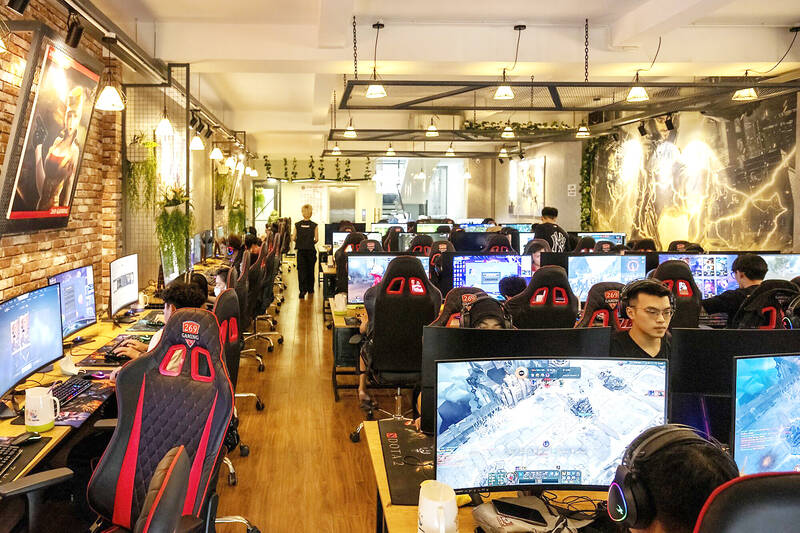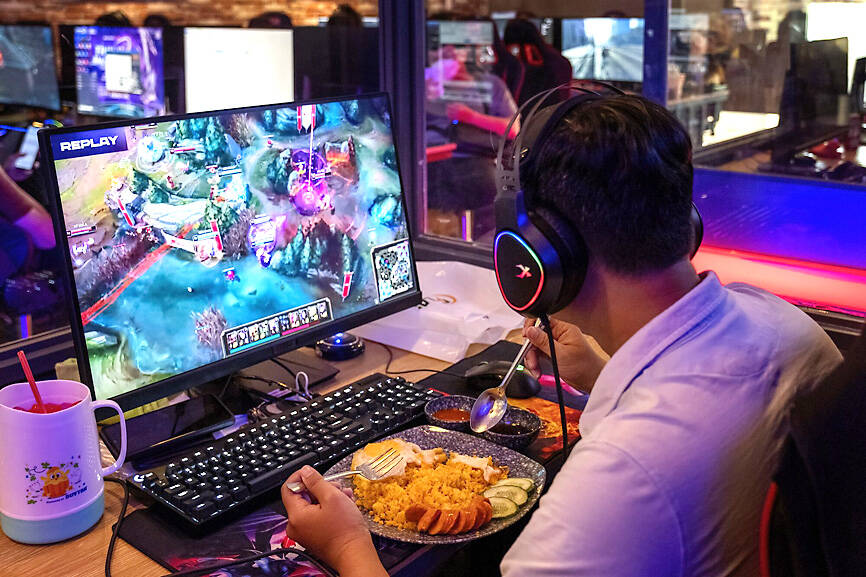Not long ago, Vietnam’s government warned parents that too many video games could lead children to a life of crime — even murder.
However, when the first-ever Vietnam GameVerse Day was held in Ho Chi Minh City earlier this year, government officials were front and center promoting the country as the region’s hottest market for game development.
Hanoi now views mobile games as an export asset and a crucial part of its emerging technology sector, as it seeks to shift beyond being a center for outsourced software and sneaker factories. The change is also an acknowledgment of the industry’s economic potential: The global mobile gaming market is estimated to exceed US$300 billion next year, with an annual growth rate of more than 7 percent in the coming years.

Photo: Bloomberg
The country ranked among the world’s top five in mobile game production by downloads in the first half of this year, according to analytics firm data.ai.
While Vietnam is one of the five communist-ruled countries in the world, the gaming industry’s rise is not too much of a surprise for those who have seen the economy firsthand. Smartphone penetration is among the highest in Asia and about half of its population is younger than 30.
Hustling and competing is part of everyday life in Vietnamese cities, where street vendors line congested streets selling noodle dishes and ice coffees while tech entrepreneurs make elevator pitches at networking events.

Photo: Bloomberg
The local gaming industry is led by a growing cadre of game developers and publishing start-ups including Amanotes Pte Ltd, known for its mobile music games, and Falcon Squad publisher OneSoft Global Pte Ltd.
Their rise also reflects Vietnam’s success at bolstering its education system. Vietnamese students regularly outperform counterparts in the US and other Organisation for Economic Co-operation and Development countries on Programme for International Student Assessment test scores, and interest in engineering and technology runs high. Coding camps for children are increasingly popular, while universities include game development in curricula.
“There is that Silicon Valley go-out-and-get-it spirit in Ho Chi Minh City,” said Khoi Nguyen, founder of Good Story Time, a start-up creating tools for video game development.
He relocated to Vietnam from the San Francisco Bay Area after working as a lead engineer for Oculus VR Inc, acquired by Meta Platforms Inc in 2014.
“The engineering talent is pretty top notch,” he said.
Vietnam first caught the attention of global gamers in 2013 after Hanoi developer Dong Nguyen created a simple, but addictive, game called Flappy Bird that became a sensation. It was so popular that Dong, reportedly disconcerted by the sudden attention, took it down — but not before earning as much as US$50,000 a day from pop-up advertisements.
Flappy Bird provided a jolt to Vietnamese developers, who saw how successful such simple mobile games, widely known as casual games, could be.
Thai Thanh Liem, chief executive officer of game publisher Topebox Co and part of the new generation of successful gaming entrepreneurs, recalled the excitement of those early days a decade ago. He and his friends, who would later become cofounders of the company, worked tirelessly on free-to-play games that would later be downloaded on smartphones from Singapore to San Francisco.
“We would eat, sleep and work together on the rooftop,” he said, looking back on nights huddled over laptops on a small roof — Vietnam’s version of a Silicon Valley garage.
Their first game, within a year, achieved half a million downloads and US$1 million in global revenue. Bigger hits followed.
Sky Dancer, a parkour-style game in which characters bounce off cliffs and floating islands, is published in China by TikTok Inc’s parent company ByteDance Ltd, and has been downloaded at least 50 million times.
Game studios now dot the country, competing to create the next global blockbuster. Amanotes’ Magic Tiles 3 ranked among the 20 top mobile games in global downloads last year, according to Sensor Tower Inc, which provides market research on mobile apps and digital advertising.
Amanotes said the game has been downloaded more than 1 billion times since its release in 2017.
OneSoft was last year the world’s fourth-largest mobile game publisher by downloads from the App Store and Google Play, data.ai said, while Zego Studio ranked ninth among app and games publishers worldwide in terms of downloads in the fourth quarter last year, Sensor Tower said.
The country was also a center for blockchain games, before a heist of about US$600 million from a blockchain network connected to the popular Axie Infinity online game created by Ho Chi Minh City start-up Sky Mavis Inc.
Bill Vo, cofounder and chief executive officer of Amanotes, said that while it has more than 3 billion downloads of its games, many users are not aware of the company’s nationality.
“People don’t know Amanotes is a Vietnamese company,” he said. “We are positioning ourselves as a global company.”
Amanotes — a portmanteau of amateur and musical notes — is best known for the music games Magic Tiles 3 and Tiles Hop, and has 100 million monthly active users, most of them in the US.
Amanotes is in discussions with potential investors, including private equity firms and venture capitalists, as it looks to scale its business, Vo said.
Vietnamese developers face growing challenges in the global gaming market as governments adopt stricter data collection regulations. The changes are forcing gaming companies to devote resources to directly engage with players and encourage them to volunteer information so developers can customize games.
This adds more expense for larger companies, and is particularly difficult for smaller start-ups to pull off, said Kelly Wong, vice president of game entertainment at Vietnamese gaming, messaging and payment giant VNG Corp, which is reportedly eyeing a US listing.
“The Flappy Bird model is not going to exist anymore,” he said.
Most of the popular Vietnamese games free-to-play casual games have simple interfaces, while a successful few such as Amanotes also offer subscription services. Others are likely to try gearing their games for consoles, but such changes would be difficult for many.
Developing games for consoles such as PlayStation and Xbox would require several years and more than US$100 million in investment, Wong said.
However, Vietnam’s developers are gaining experience and the costs of making big-budget video games would likely decrease with new technology, making more sophisticated games possible, said Ho Chi Minh City-based Binh Tran, cofounder of Ascend Vietnam Ventures.
For now, the government appears to be supporting its growth. While it had previously considered taxing online gaming services, it recently decided against such a move for now, providing some relief to domestic gaming companies.
Growing tensions between China and the US could also work to the advantage of Vietnamese game developers as publishers look outside of China for developers of more sophisticated projects, said Samuel Stevenin, art division managing director of Virtuos Ltd, a video game development company with three Vietnam production studios.
“It’s making Vietnam — and the whole of Southeast Asia — more attractive,” he said.

In Italy’s storied gold-making hubs, jewelers are reworking their designs to trim gold content as they race to blunt the effect of record prices and appeal to shoppers watching their budgets. Gold prices hit a record high on Thursday, surging near US$5,600 an ounce, more than double a year ago as geopolitical concerns and jitters over trade pushed investors toward the safe-haven asset. The rally is putting undue pressure on small artisans as they face mounting demands from customers, including international brands, to produce cheaper items, from signature pieces to wedding rings, according to interviews with four independent jewelers in Italy’s main

Japanese Prime Minister Sanae Takaichi has talked up the benefits of a weaker yen in a campaign speech, adopting a tone at odds with her finance ministry, which has refused to rule out any options to counter excessive foreign exchange volatility. Takaichi later softened her stance, saying she did not have a preference for the yen’s direction. “People say the weak yen is bad right now, but for export industries, it’s a major opportunity,” Takaichi said on Saturday at a rally for Liberal Democratic Party candidate Daishiro Yamagiwa in Kanagawa Prefecture ahead of a snap election on Sunday. “Whether it’s selling food or

CONCERNS: Tech companies investing in AI businesses that purchase their products have raised questions among investors that they are artificially propping up demand Nvidia Corp chief executive officer Jensen Huang (黃仁勳) on Saturday said that the company would be participating in OpenAI’s latest funding round, describing it as potentially “the largest investment we’ve ever made.” “We will invest a great deal of money,” Huang told reporters while visiting Taipei. “I believe in OpenAI. The work that they do is incredible. They’re one of the most consequential companies of our time.” Huang did not say exactly how much Nvidia might contribute, but described the investment as “huge.” “Let Sam announce how much he’s going to raise — it’s for him to decide,” Huang said, referring to OpenAI

Nvidia Corp’s negotiations to invest as much as US$100 billion in OpenAI have broken down, the Wall Street Journal (WSJ) reported, exposing a potential rift between two of the most powerful companies in the artificial intelligence (AI) industry. The discussions stalled after some inside Nvidia expressed concerns about the transaction, the WSJ reported, citing unidentified people familiar with the deliberations. OpenAI makes the popular chatbot ChatGPT, while Nvidia dominates the market for AI processors that help develop such software. The companies announced the agreement in September last year, saying at the time that they had signed a letter of intent for a strategic